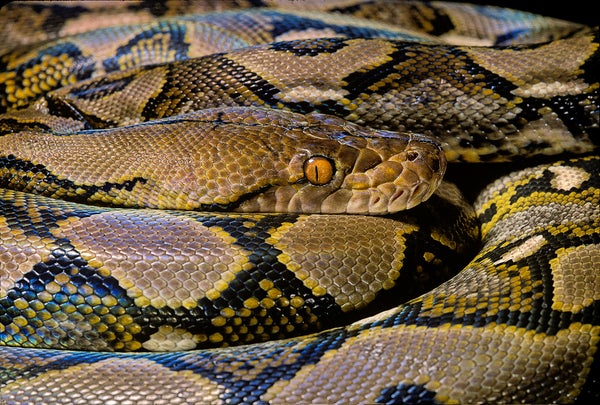Snake Steak Could Be a Climate-Friendly Source of Protein
Pythons turn their food into meat pretty efficiently, a study finds, making them an intriguing alternative to climate-unfriendly cows
Reticulated python (Malayopython reticulatus).
Paul Starosta/Getty Images
Put aside your chicken cutlets and meatloaf and say hello to python curries and satay skewers. Some snake scientists think eating these reptiles—already customary or at least acceptable in parts of the world—might help lessen the damage our food choices have on the environment.
With some eight billion people on the planet today, all of whom require protein to stay healthy, finding new sources of these nutrients is a crucial issue. “The general conundrum we somehow need to solve is: Where do we get the appropriate amounts of protein for a still-growing global population without the big environmental footprint?” says Monika Zurek, a food systems scientist at the University of Oxford, who was not involved in the new research. Humans’ dietary staples, particularly those of Westerners, have serious consequences. The environmental impacts of cattle products such as beef are especially costly: the animals produce nearly 10 percent of the world’s greenhouse gas emissions, and growing food for them spurs deforestation. Pork brings a separate set of environmental hazards, notably water pollution from pig waste. The chicken industry faces similar issues.
But how do you get from the challenge of providing sufficient protein to farming pythons for meat? For Dan Natusch, a herpetologist at Macquarie University in Australia, the idea came about tangentially. He and his colleagues were working with existing commercial python farms in Vietnam and Thailand to determine whether they could distinguish wild-bred snakes from captive-bred ones. During the study, the researchers noticed the farmed pythons’ propensity for speedy growth, which they’ve documented in research published in…
Read the full article here







